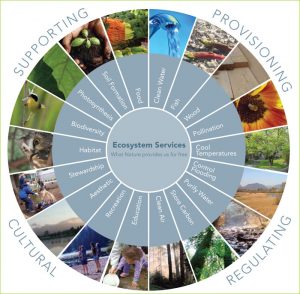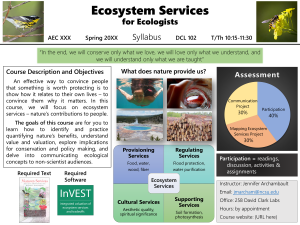Note: this course and associated web content was developed as part of fulfillment of my Certificate in Teaching and Communication. This course has not yet been offered, but provides evidence and samples of my ability to develop course content.
“In the end, we will Conserve only what we Love, we will Love only what we Understand,
and we will Understand only what we are Taught.”
Course Description
As the quote above by Baba Dioum (Senegalese Forester) so elegantly articulates, people tend to be protective of the things they understand and love. One of the best ways to convince people that something is worth protecting is to show how it relates to their own lives – to convince them why it matters.
In this course, we will focus on nature’s contributions to people. You will gain a firm grasp on the concept of the ecosystem services paradigm and ethics, learn how to and identify and practice quantifying nature’s benefits, discuss value and valuation, explore implications for conservation and policy making, and delve into communicating ecological concepts to non-scientist audiences.
Learning Outcomes
By the end of this course, students will be able to:
- Describe the main categories of ecosystem services and provide several examples of each.
- Summarize direct use value, explain the main categories of indirect use values, and make comparisons between them.
- Consider the motivations and ethics of assigning value to nature (or not doing so), and articulate a defensible argument (with evidence) for your position.
- Design an ecosystem service framework for an organism, ecosystem function or natural system, identifying benefits to people, how they may be valued, and communicate your rationale to a non-technical audience.
- Demonstrate a professional demeanor and proficiency in scientific and non-technical communication on ecosystem services through independent and team-generated written and orally presented work.
Course Information
Follow links to sample course information, including: an online schedule, description of course materials and assessment, course policies, and a sample full syllabus.
-
- Course: AEC XXX, Spring 20XX
- Instructor: Jennifer M. Archambault (jmarcham@ncsu.edu)
- Office and Hours: 258 David Clark Labs, by appointment
- Meeting Information: T/Th 10:15 – 11:30 AM, David Clark Labs Room XXX

